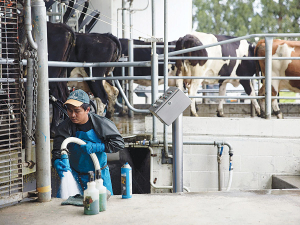Editorial: RMA reforms uproar
OPINION: The euphoria over the Government’s two new bills to replace the broken Resource Management Act is over.
 The ‘band-aid’ solution of extending priority processing of visas is simply bringing no joy to farmers in desperate need of staff for calving.
The ‘band-aid’ solution of extending priority processing of visas is simply bringing no joy to farmers in desperate need of staff for calving.
OPINION: It's time for the Government to step in and resolve the migrant worker visa issue for the dairy sector, once and for all.
The ‘band-aid’ solution of extending priority processing of visas is simply bringing no joy to farmers in desperate need of staff for calving, nor to experienced and eager workers ready to help with calving on NZ dairy farms.
According to Federated Farmers, the dairy sector needs up to 1000 workers for calving season now underway. However, it’s taking up to six months for Immigration NZ to process visas.
Federated Farmers has been working closely with the Minister of Immigration and INZ to try and find solutions to alleviate some of the pressure short-staffed farmers are under and prevent any animal welfare issues during calving.
Last week, farmers got some relief. Immigration Minister Erica Stanford agreed to some limited exceptions for existing visa applications, where the applicant is already onshore, to facilitate them being on farm as soon as possible.
The Minister has also agreed to extend priority processing for dairy farm worker and dairy farmer visa applications until 1 September, which should at least see farmers through the bulk of South Island calving. But it only relieves some of the short-term pressure this season, and it’s only a band-aid solution.
The time has come for the Government to address some of the bigger, longer-term challenges with the immigration system.
For starters, the accredited employer scheme is a shambles.
Farmers pay to become accredited employers; it’s a time-tested process and farmers must have a long history of being good employers and keep good records. But it’s still taking farmers four to five months to get a visa for overseas workers.
If the Government doesn’t fix these challenges over the next 12 months, farmers will find themselves back in the exact same situation next season.
Agrisea NZ has appointed Craig Hudson as it's new chief growth officer.
State farmer Landcorp, trading as Pamu, is a forecasting a full-year net profit of around $100 million.
Tony Aitken, chief executive of Ruralco, has been awarded the Excellence in Business Leadership Award at the ANZ Business of the Year Awards.
Global trade has been thrown into another bout of uncertainty following the overnight ruling by US Supreme Court, striking down President Donald Trump's decision to impose additional tariffs on trading partners.
Controls on the movement of fruit and vegetables in the Auckland suburb of Mt Roskill have been lifted.
Fonterra farmer shareholders and unit holders are in line for another payment in April.